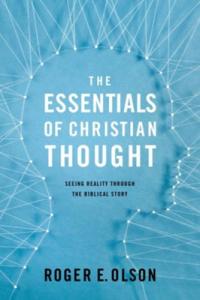Essentials of Christian Thought, Chapter 3: The Biblical Vision of Ultimate Reality Retrieved
Again I ask that those not reading the book only ask questions. Readers are more than welcome to comment and/or ask questions. We come now to Chapter 3 and Interlude 3.
Is there one main point of this chapter? I suppose it is that ultimate reality is both separate from nature and immanent with in. Also that ultimate reality, for the biblical writers and for most Christians throughout the ages, is a personal being, A being, not Being Itself, transcendent to creation, source of all that is good, but also relational with creation. He can be acted upon; he is not the “actus purus” (pure actuality without potentiality) posited by those Christians who have succumbed to Aristotelian and some other philosophical influences.
As I read what I wrote, I feel a bit of the frustration I felt leading up to writing and while writing it. Over the years I had read and heard so many Christians expressing so many unbiblical views of reality, even of ultimate reality, that I built up a pent up reservoir of frustration. How could so many knowledgeable Christians be so confused about God and creation?
On the one hand I had/have close relatives and friends who were/are “young earth creationists” and believe the biblical-Christian worldview necessarily includes that God created everything by divine fiat only several thousand years ago. On the other hand, I had/have students, colleagues and acquaintances, all Christians, who absorbed into their thought lives beliefs about God and creation from secular or other non-Christian worldviews. For many years I was surrounded by Christians in churches and in Christian institutions of higher education who were confused about ultimate reality. That is, they believed things that were absolutely contrary to what the Bible itself clearly implied.
Here, in this chapter, and in the following interlude, I lay out what I believe the Bible AND historic, classical Christian thought (e.g., the church fathers and reformers) teaches and taught about ultimate reality—that it is personal, not impersonal, and yet transcendent to and immanent within creation.
I suppose the most notable thing about this chapter is the sources I rely on (beyond the Bible) such as my two “guides” in discovering and explicating a “biblical metaphysics,” Claude Tresmontant and Edmund Cherbonnier, and my theology professor Wolfhart Pannenberg and two outstanding theologians who worked on “biblical philosophy”: Emil Brunner and Abraham Heschel.
They and I (and others, of course), believe that much of Christian thought, both scholarly and popular, has been corrupted by alien philosophies. Philosopher Alfred North Whitehead said that Christianity is a religion in search of a metaphysic. My sources and I believe that should not be the case because our main source, the Bible, has a metaphysic. Brunner called it “biblical personalism.” Ultimate reality is a person, a being, not Being Itself or The One of neo-Platonism or the Absolute Spirit of Hegel, etc. Certainly not the Unmoved Mover of Aristotle and Thomas Aquinas.
None of which is to say that extra-biblical philosophies cannot contribute to a robust Christian metaphysic. My sources and I make no claim that extra-biblical philosophies must be shunned (a la Tertullian). The ONLY point is that the Bible assumes a particular view of ultimate reality behind the appearances of the senses.
In the Interlude I go out of my way to clear up predictable objections. I talk about the proper role of Christian apologetics.
I hesitate to say this, but say it I will. As I re-read what I wrote in this chapter and the book as a whole I am surprised at how Sunday Schoolish it sounds in my own mind’s “ears” and how new and even foreign it must sound in the ears of many readers’ minds, even devout Christians. I hate to sound like a cranky old school teacher, but I was absolutely astounded by how little many of my students and colleagues knew about the Bible and especially about biblical thought, a biblical-Christian view of reality. I heard them spouting all kinds of nonsense, nonsense compared with what they should have known and thought if they were biblically literate.
It seems to me that biblical literacy among American Christians has fallen away. In the evangelical Christianity in which I was raised, Bible knowledge was emphasized very emphatically. They may not have had much real understanding of the Bible, but at least the foundation was there. Now, so it seems, the foundation is gone. Who really reads or studies the Bible anymore? Now, in most churches, if the Bible is read from the pulpit or lectern the reader has to tell people what page the passage is on in their “pew Bibles.”
Obviously, this book was written for people who are at least somewhat biblically literate because I don’t quote the Bible very much. I assume familiarity with the Bible and its story of God and the world and humanity. Frankly, I wrote it for teachers in Christian colleges and universities. But I want others to read it as well. My crazy dream was that Christian college and university administrators would require faculty to read it for understanding the “faith” part of “integration of faith and learning.”
This is kind of a side bar: When I taught in a Christian liberal arts college’s “degree completion” program, populated almost exclusively by adults who had two years of college experience and wanted to earn a bachelor’s degree in a program designed especially for them, I had students read Arthur Holmes’s book Contours of a Worldview. It was then the only book like it in print—an allegedly complete book explicating the biblical-Christian worldview. Sadly, I had to explain almost every paragraph to the students. I admitted to myself, not to them, that it was really not a very good book. I understood it, but I understood why most none of my students, most of them life-long Christians, understood any of it. It did not measure up to Holmes’s other books. So I started writing my own book but never finished it—until this one. But I intended this one to replace Holmes’s book. I wish I had written it before beginning to teach that course on “Developing a Christian Worldview”—a course I invented and almost exclusively taught for about ten years.
*If you choose to comment, keep it relatively brief (no more than 100 words), on topic, addressed to me, civil and respectful (not hostile or argumentative), and devoid of pictures or links. If you have not read the chapter, ask a question. If you have read it, feel free to comment and/or ask a question.*














